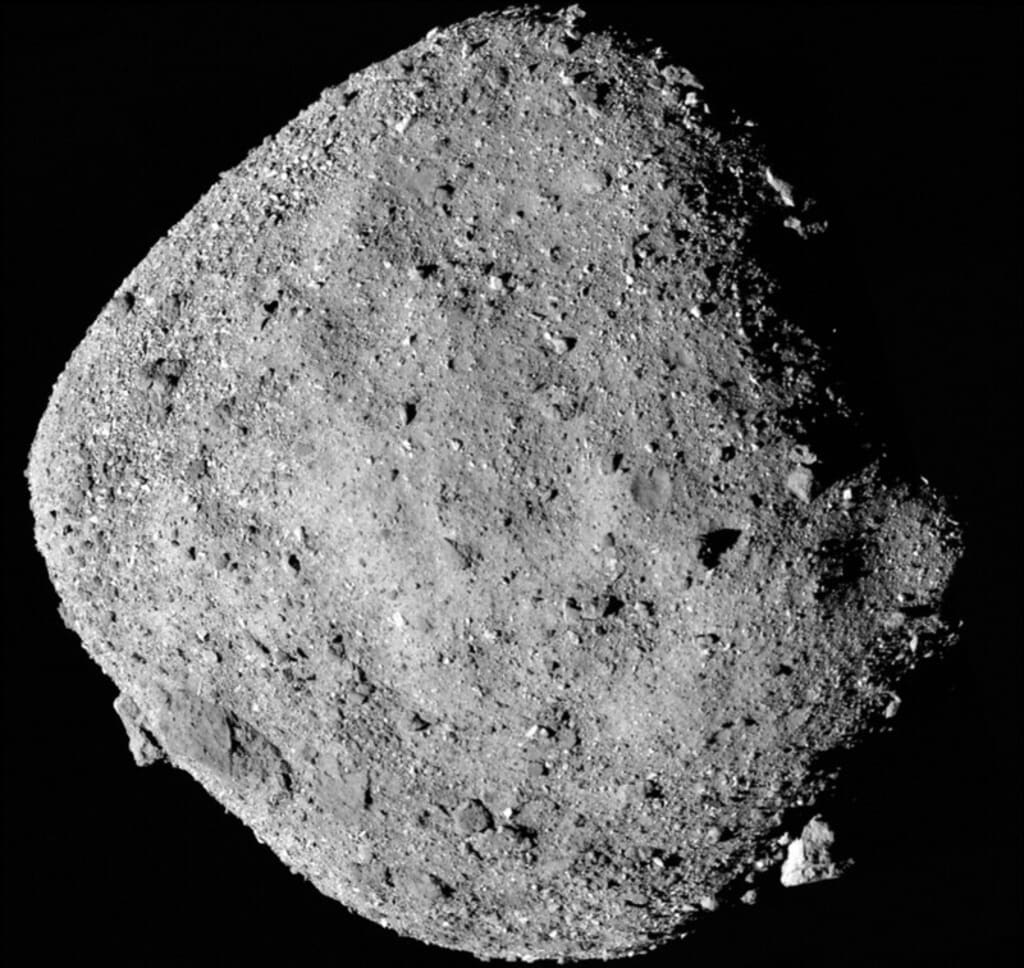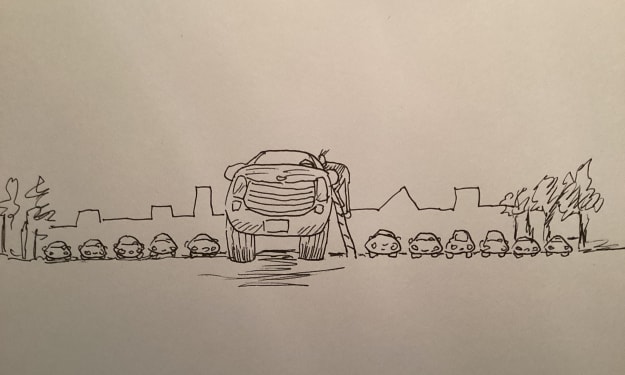Doomsday 2182? (You Don’t Actually Need to Worry About the Bennu Asteroid)
Odds of an Asteroid Strike: Low. Odds of Sensational Headlines: High.

“Did you hear about the asteroid?” said my partner over Sunday morning’s first sip of coffee.
“Oh, you mean the one that the samples just returned from?”
“No. The Asteroid.”
“The asteroid?”, I said, incredulously taking another sip of my latte
“The one that’s going to kill us all - I read that there is an actual chance it’ll strike Earth.”
“Soon? Do you know where it’s going to hit? The ocean, I’d guess…”
“No, Liv, a big asteroid. A doomsday asteroid. It could wipe out all life in 2182”
I was stunned, to say the least. Even considering such an event is humbling - and more than mildly existentially perturbing. I turned to the internet to verify and immediately saw confirmations of what my partner had said: “Asteroid Bennu Could Shatter Earth”; “NASA said an asteroid could hit Earth”; “Asteroid as big as the Empire State Building may one day hit Earth” and similar titles littered Google News.
But something felt off. These articles sounded more sensational than NASA tends to be - my nerd senses were tingling. So, in classic nerd spirit, I set to digging and sticking my nose into every cranny of information I could find. Surprise, surprise, a good proportion of websites were employing clickbait headlines to get more people on their sites.
Looking for news on the asteroid that isn’t sensational? Here are the facts about the asteroid, sans the usual internet fluff:
---
What is the Bennu Asteroid?
The Bennu Asteroid, officially called 101955 Bennu by NASA, is a near-Earth asteroid with a 0.15 mile (0.24 kilometer) radius. Roughly, it’s about the size of a regular skyscraper - smaller than the Empire State Building, certainly. It orbits the sun every 1.2 years and makes a closer approach to Earth every 6 years. Now note that that "closer" is relative. We’re talking 40 million miles away still, which is quite closer to its usual 200 million mile distance, but, even at its closer ranges, it will still take over 4 minutes to travel to it if we were traveling at the speed of light.
How Likely is it That the Bennu Asteroid Will Actually Hit Earth?
The actual likelihood of impact is incredibly low: a “1 in 2700, or 0.037% chance”, according to USA Today. This small number is much less extreme than what a lot of headlines are saying - and what word of mouth might have reached you.
Note to the Reader: Most of the articles on this topic, especially those from trustworthy sources have been fairly good at sharing this information in the body of their content - if you’ve read any of these articles all the way through, the statistic above likely looks familiar to you. But, still, even reputable sites are not reflecting it well in their headlines. Let this serve as another reminder to read a full article before assuming what an article is reporting from the headline!
We’re looking at small odds here - it would be more statistically likely for you to accurately guess a coin flip 11 times in a row than it would be likely for the asteroid to strike. Despite the impressive collection of knowledge and equations in the toolbelts of our greatest physicists, there are too many variables to yet predict any sort of event like an asteroid strike that far in the future with much certainty. But our brilliant physicists have been able to calculate a rather comforting fact in the meantime - Bennu is the next possible dangerous asteroid strike - we’re more than likely safe for the next 100 years at least.
Even if Bennu does manage to hit our planet, according to Interesting Engineering, there is a “70% chance [any given asteroid] will land in the ocean and a 25% chance it will land over a relatively unpopulated area”. That means that the likelihood of Bennu directly striking land is actually 30% of 0.037% (0.011%), and striking a populated area is actually 5% of 0.037% (0.0019%). Your descendants have strikingly good odds of not being struck by the asteroid.
What Would Happen if Bennu Hits Earth?
So, let’s pose that, despite the odds, Bennu does end up striking our lovely little planet. What then? Space.com said it best,
"Bennu is large enough to cause significant destruction on Earth. If it hit us, the space rock would punch a crater several miles wide into the planet's surface. The impact would also spawn an earthquake and a shockwave through Earth's atmosphere, which together would likely damage buildings hundreds of miles away from the impact site."
So, the results wouldn’t exactly be a great time for our descendants, especially for those anywhere within hundreds of miles away from the site of impact, but it doesn’t even pack enough of a punch to threaten planetwide extinction. For comparison, the massive asteroid that caused a mass extinction 66 million years ago was 6 miles wide, an object 4 times larger than our dear little Bennu. And not that even that was survived by our scrappy ancestors.
When Would the Bennu Asteroid Hit Us?
The current prediction is 2182, on September 24th. There’s a slim chance that a Near-Earth Pass (a distance of 125,000 miles) will alter its orbit in 2035 so that its trajectory will be pulled towards Earth enough to collide nearly fifty years later.
If you’re interested in learning about this phenomenon that could slingshot Bennu into us, called a gravitational keyhole, MIT published an excellent article that covers the concept. You can read that here: How to deflect an asteroid | MIT News
Why You Don’t Need to Worry About the Bennu Asteroid:
First and foremost, the likelihood of your survival to 2182 is even slimmer than the likelihood of the asteroid hitting Earth. By the time anything like this happens, we’ll all be long gone and our children will be long gone, too, unless some mad scientist down the road cracks the code of immortality. Not likely.
But, also, NASA's OSIRIS-REx mission successfully sampled the asteroid, giving scientists excellent insight into what Bennu is made out of - part of the results of this is why we know so much about the trajectory of Bennu. Research is ongoing, but there’s a decent chance that it can help us determine how to best blast it away, should it eventually pose a significant threat.
And, even if it does turn out to be the case that it will hit us, we have over 150 years to figure out technology to counteract it. Say what you will about the human race, but we’re rather good at advancing technology, particularly when richer governments are happy to pour billions of dollars towards innovation.
As of what we know now, scientists aren’t even worried about this event. W
---
After several days of investigation into Bennu, I still find myself stunned, but now for a rather different reason. I’m stunned by the brilliance of the scientists on the Bennu project and other space-understanding pursuits and by the wealth of knowledge they’ve already managed to gain in the blip of time we’ve been able to reach outside our atmosphere. Less than 70 years after the first satellite was launched, unmanned research vessels are landing on asteroids unceremoniously and conducting scientific research to calculate trajectories of celestial bodies far in the future. Imagine, then, what we might be able to do 150 years from now.
It seems like we’ll be okay.
About the Creator
Olivia L. Dobbs
Science Enthusiast, Naturalist, Dreamer, Nerd.
I crosspost my Medium articles here :)
You can find my main account on Medium: https://medium.com/@oliviadobbs13
Check out my science! -> bit.ly/DobbsEtAl
Enjoyed the story? Support the Creator.
Subscribe for free to receive all their stories in your feed. You could also pledge your support or give them a one-off tip, letting them know you appreciate their work.






Comments
There are no comments for this story
Be the first to respond and start the conversation.